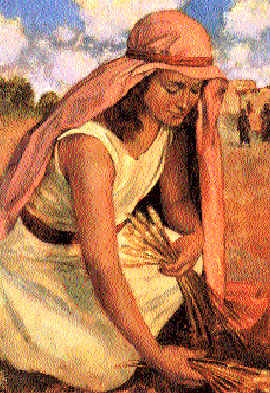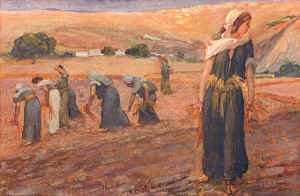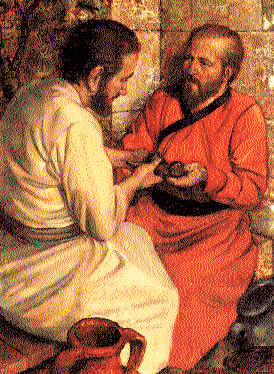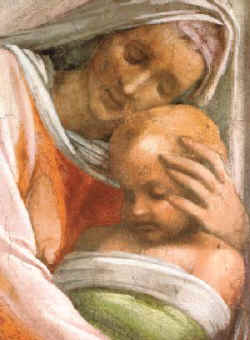The Bible: Ruth: Romance and Redemption
Ruth meets Boaz: Ruth 2
In Israel, the barley harvest began in the spring. The community in Bethlehem observed God’s law concerning harvesting: “When you reap the harvest of your land, do not reap to the very edges of your field or gather the gleanings of your harvest…. Leave them for the poor and the alien” (Leviticus 19:9-10).
 |
| “And Ruth the Moabitess said to Naomi, ‘Let me go to the fields and pick up the leftover grain behind anyone in whose eyes I find favor’” (Ruth 2:2). Illustration above by Dan Andreason; below by James Tissot |
 |
Ruth was both poor and an alien. She had few prospects in Judah, as Naomi had warned her. However, she was able to provide for Naomi and herself by working hard gleaning the grain left by the harvesters (Ruth 2:2).
There is an almost idyllic quality to the Bethlehem community described in Ruth, which — especially when one considers it existed during the turbulent period of the judges — testifies powerfully to the difference a few people living God’s way can make. Bethlehem would later become famous, first as the “town of David” and later as the birthplace of the Messiah (Luke 2:4-7).
“As it turned out, [Ruth] found herself working in a field belonging to Boaz, who was from the clan of Elimelech” (Ruth 2:3). Boaz was a “man of standing [Hebrew: ‘ish gibbor chail, implying Boaz was physically impressive and had noble character]” (verse 1).
Boaz asked his foreman who the stranger gleaning in the field was. The foreman replied that she was the young woman who had accompanied Naomi back from Moab. Boaz then told Ruth to continue gleaning in his field, and helped her far beyond the demands of the law. He even ordered his harvesters to make Ruth especially welcome, enabling her to gather extra barley.
Ruth then asked Boaz, “Why have I found such favor in your eyes that you notice me — a foreigner?” (verse 10). Ruth’s expression about finding favor in Boaz’s eyes, used by her on three occasions (verses 2, 10, 13), was a culturally appropriate way of showing respect. Ruth thus displayed the type of attitude the apostle Paul later taught Christians to have, when he said, “In humility consider others better than yourselves” (Philippians 2:3).
Boaz, in turn, was impressed by Ruth’s reputation: “I’ve been told all about what you have done for your mother-in-law since the death of your husband — how you left your father and mother and your homeland and came to live with a people you did not know before. May the Lord repay you for what you have done” (Ruth 2:11). A good reputation, founded on God-centered character, is of great value (Proverbs 22:1; Ecclesiastes 7:1).
At the end of the day, Ruth returned home to Naomi with an exceptionally generous amount of grain. Naomi immediately realized someone had taken special care of Ruth, and upon hearing that it was Boaz, she exclaimed, “The Lord bless him!” and “He [the reader is made to ask to whom Naomi is referring — Boaz or Yahweh] has not stopped showing his kindness to the living and the dead” (Ruth 2:20). Naomi’s bitterness toward God had begun to lessen. She now gladly encouraged Ruth to continue to glean in Boaz’s field.
Naomi’s plan for Ruth: Ruth 3
Ruth continued to glean in Boaz’s field for about seven weeks, until the end of the barley and wheat harvests, around the time of Pentecost. Naomi had earlier hoped that Ruth would find “rest” (Hebrew: minuchah) in the home of another husband in Moab (Ruth 1:9). Now Naomi said to Ruth, “Should I not try to find a home [Hebrew: manoach, which, like the related word minuchah, means “a condition of rest and security attained by marriage”] for you, where you will be well provided for?” (Ruth 3:1). Naomi’s hopes for Ruth now centered upon Boaz, who might act as a “kinsman-redeemer” (verses 1-9).
A kinsman-redeemer was a relative who could redeem a poor person’s inheritance (Leviticus 25:25). In certain circumstances, where there was no heir, a near relative could act as kinsman-redeemer by marrying the relative’s widow to redeem the inheritance. A relative was not obligated to act as kinsman-redeemer, however. If no relative chose to help, the widow would probably live in poverty.
Naomi therefore suggested to her daughter-in-law a plan of action: “Wash and perfume yourself, and put on your best clothes. Then go down to the threshing floor, but don’t let [Boaz] know you are there until he has finished eating and drinking. When he lies down, note the place where he is lying. Then go and uncover his feet and lie down. He will tell you what to do” (Ruth 3:3-4).
Ruth did as Naomi told her. Something startled Boaz in the middle of the night, and he awoke to discover a woman lying at his feet. Boaz asked who she was. Ruth identified herself and then seized the initiative: “Spread the corner of your garment over me, since you are a kinsman-redeemer” (verse 9). Ruth was boldly asking Boaz for a pledge from him to marry her. This same expression is used for God’s relationship with Israel: “I spread the corner of my garment over you” (Ezekiel 16:8). Ruth’s action was in accord with the law of levirate marriage, which required the initiative of the widow in seeking the marriage (Deuteronomy 25:5, 7-10).
 |
| “(Now in earlier times in Israel, for the redemption and transfer of property to become final, one party took off his sandal and gave it to the other. This was the method of legalizing transactions in Israel.) So the kinsman-redeemer said to Boaz, ‘Buy it yourself.’ And he removed his sandal. Then Boaz announced to the elders and all the people, ‘Today you are witnesses that I have bought from Naomi all the property of Elimelech, Kilion and Mahlon’” (Ruth 4:7-9). Dan Andreason Below, Ruth and Obed, by Michelangelo, detail from the Sistine Chapel ceiling |
 |
Boaz felt honored by Ruth’s request because she was “a woman of noble character [Hebrew:‘esheth chail, the term applied to the ‘Proverbs 31 woman’]” (Ruth 3:11). Boaz informed her, however, that Naomi had a closer relative. This man had the first option to marry Ruth and redeem Naomi’s inheritance. Boaz assured Ruth that if this other relative was not prepared to act as kinsman-redeemer, then he certainly would be. Ruth would now have to wait until the matter was settled with the other relative.
Ruth, Boaz and Christ
To appreciate how Boaz foreshadowed Christ, we must first understand the significance of an ancient Israelite law concerning the kinsman-redeemer (Hebrew: go’el). This law helped ensure that inherited land remained within the family. It stated, “If one of your countrymen becomes poor and sells some of his property, his nearest relative is to come and redeem [Hebrew: ga’al, the same root asgo’el] what his countryman has sold” (Leviticus 25:25).
Both words, go’el and ga’al, occur frequently in chapters 2 and 3 of Ruth. Since Boaz was a kinsman (go’el) of Naomi, he was eventually able to redeem (ga’al) her land through marriage to Naomi’s daughter-in-law Ruth. (Presumably, Naomi and her husband had previously sold the land before they moved to Moab.)
The concern Boaz displayed as kinsman-redeemer to the widow reflects an aspect of God’s own character. “Yahweh is the go’el of the fatherless and widow and pleads their cause” (Theological Dictionary of the Old Testament, vol. 2, p. 353; see also Proverbs 23:10-11 and Jeremiah 50:34).
In the New Testament, we see the ultimate kinsman-redeemer in Jesus Christ, who redeemed us from sin by dying for us (1 Peter 1:18-19). In many respects, Boaz typifies Christ. Donald A. Leggett writes, “In the actions of Boaz as goel we see foreshadowed the saving work of Jesus Christ, his later descendant.”
Dr. Leggett goes on to explain: “As Boaz had the right of redemption and yet clearly was under no obligation to intervene on Ruth’s behalf, so it is with Christ. As Boaz, seeing the plight of the poor widows, came to their rescue because his life was governed by Yahweh and his laws, so also of the Messiah it is prophesied that his life would be governed by the law of God and that he would deal justly and equitably with the poor and with those who were oppressed (Ps. 72:2, 4, 12, 13; Isa. 11:4)” (The Levirate and Goel Institutions in the Old Testament With Special Attention to the Book of Ruth,Mack Publishing, 1974, p. 298).
Boaz marries Ruth: Ruth 4
Boaz went to the city gate, the traditional center of business and civic activity. The husband of the idealized “Proverbs 31 woman” is said to be “respected at the city gate, where he takes his seat among the elders of the land” (Proverbs 31:23). Boaz knew he was likely to find the other relative here, and it was also a suitable place to find citizens to witness the business transaction.
Boaz presented the case to the relative. He explained that the relative had the first right to redeem Elimelech’s land. The relative agreed to do so, but when Boaz told him that buying the land obligated him to marry Ruth, he promptly backed down — as Boaz hoped he would. Perhaps the relative feared that if he would have a son by Ruth, his investment in the new property would be transferred from his family to the family of Elimelech. Whatever the reason for the man’s refusal, the right to marry Ruth now passed to Boaz. This transaction was witnessed by all the people at the gate.
In due course, Boaz married Ruth and she bore him a son, Obed. Obed later became the father of Jesse and the grandfather of David (Ruth 4:17). Through David, Ruth became an ancestor of Jesus Christ (Matthew 1:5, 16).
Articles in “Exploring the Word of God: Historical Books”
|
This was also a reversal of fortune for Naomi. Although the sorrow of her previous loss undoubtedly never left her, Naomi could now rejoice in Ruth’s happy family life and share in the joy of raising a new son, Obed (Ruth 4:14-17).
The book of Ruth is unquestionably a delightful story. Edward F. Campbell, Jr., writes,
The speeches fit the characters who speak them…. Boaz and Naomi talk like older people. Their speeches contain archaic morphology [word forms] and syntax [word order]…. Ruth is pleased by every good thing done for her; Naomi moves as though she were gradually realizing that things are not as bitter as she had thought. As for Boaz, he moves through the story like the patriarch he is, warmly greeting his workers in the field, ceremoniously blessing Ruth in the name of Yahweh, recovering his aplomb quickly at the threshing floor so as again to bless Ruth, conducting the hearing at the gate methodically, but with alacrity. (Ruth, The Anchor Bible, Vol. 7, p. 17)
This story, short and delightful as it is, contains important spiritual lessons. Like Naomi, we should not turn our backs on God when tragedy strikes our lives. We may feel anger at God and express our emotions in honest prayer to him, and still remain righteous — looking beyond the short term toward his eternal plan. God will reward the righteous in due time.
The events recorded in Ruth were part of God’s preparations for the births of David and of Jesus, the promised Messiah. Just as Ruth was unaware of this larger purpose in her life, we will not know the full purpose and importance of our lives until we are able to look back from the perspective of eternity. We must make our choices with God’s eternal values in mind…. Because of Ruth’s faithful obedience, her life and legacy were significant even though she couldn’t see all the results. Live in faithfulness to God, knowing that the significance of your life will extend beyond your lifetime. (Life Application Bible, NIV, commentary on Ruth 4:16-17)
Author: Jim Herst and Tim Finlay
